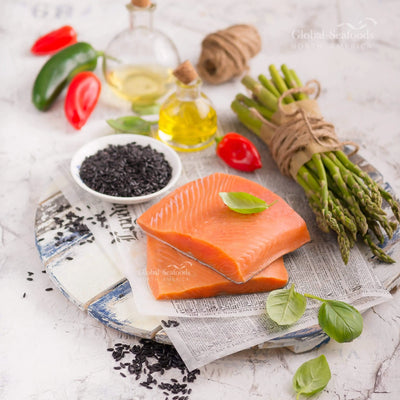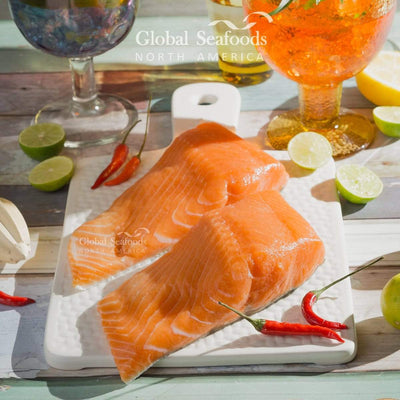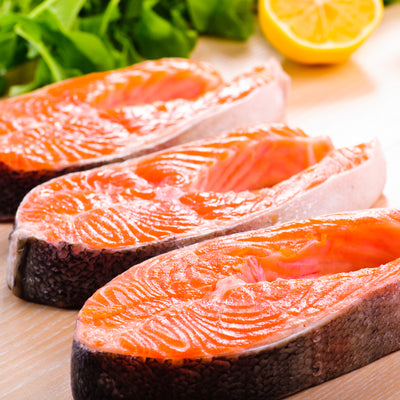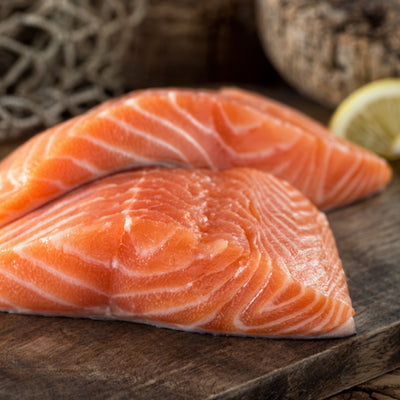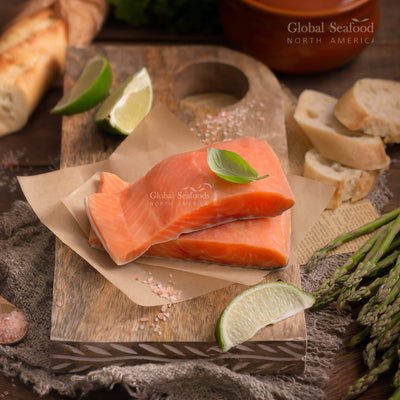How to Store Salmon and Keep it Fresh for Longer

Storing Salmon
Salmon, including varieties like sockeye, king (Chinook), coho, Atlantic, and pink salmon, is celebrated for its rich flavors and health benefits. Whether you prefer the robust taste of wild-caught salmon or the convenience of farm-raised options, the challenge of preserving its freshness remains. This guide delves into effective storage methods for different types of salmon, ensuring that whether you have a salmon fillet or steak, it remains as delectable as the day you bought it.
Understanding Salmon
Salmon varieties, from the prized king salmon of Alaska to the versatile coho and delicate pink salmon, each offer unique flavors and textures. The distinction between wild salmon, like the sought-after wild Alaskan salmon, and farm-raised varieties, such as the ORA king salmon, affects their storage needs. Recognizing freshness is key—look for vibrant flesh and a clean smell, indicators of prime salmon, whether it's fresh Pacific salmon or frozen.
Immediate Steps After Purchase
The journey from market to meal is critical, especially for delicate types like sockeye and Atlantic salmon. Keeping salmon cold, ideally in a cooler or insulated bag, is vital to thwart the growth of bacteria and maintain its quality.
Short-Term Storage Solutions
Short-term storage in the refrigerator suits those planning to indulge in their salmon within a few days. Coho, chinook, and keta salmon benefit from airtight packaging to retain moisture and flavor.
Freezing Salmon for Long-Term Storage
Freezing offers a solution for extending the freshness of all salmon types, from silver salmon to steelhead. Proper wrapping and air removal are crucial steps to prevent freezer burn, especially for valuable catches like king salmon from Alaska and wild-caught varieties.
Vacuum Sealing for Extended Freshness
Vacuum sealing can significantly extend the shelf life of salmon, from pink to sockeye, by preventing air exposure. This method is excellent for those stocking up on seasonal catches like wild Alaskan salmon or Pacific salmon.
Curing and Smoking
Curing and smoking not only preserve salmon but also infuse it with distinct flavors. These methods are excellent for enhancing the taste of salmon varieties, including chum and red salmon, offering a gourmet twist to traditional salmon storage.
Recognizing Spoiled Salmon
Identifying spoiled salmon, whether it's farm-raised salmon or a prized piece of wild salmon, is crucial. Off-odors, discoloration, and a slimy texture are tell-tale signs that your salmon, regardless of type, is no longer safe to consume.
Cooking and Consumption Best Practices
Proper cooking methods highlight the natural qualities of salmon, from the rich oiliness of king salmon to the delicate flavor of Atlantic salmon. Salmon benefits from cooking techniques that preserve its moisture and nutritional value, making every dish, from salmon eggs to salmon steaks, a healthy delight.
Conclusion
Storing salmon, from sockeye to coho and beyond, is an art that ensures every bite is as fresh and flavorful as possible. Whether you're savoring the robust taste of Alaskan salmon, the mild flavor of white salmon, or the richness of king salmon, proper storage is key to enjoying the myriad benefits of this versatile fish. Apply these tips to keep your salmon fresh, enhancing the culinary experience of every salmon variety from chinook to pink salmon.
FAQ: Storing Salmon and Keeping It Fresh
Can I refreeze thawed salmon?
Refreezing salmon, whether it’s sockeye, king, or coho, is generally not recommended as it can affect the texture and quality of the fish. However, if the salmon was thawed in the refrigerator and has remained at a safe temperature, it can be refrozen within 1-2 days. Wild-caught and frozen salmon should be handled with care to preserve its freshness.
How long can I keep salmon in the fridge?
Fresh salmon, including Atlantic, chinook, and pink salmon types, can be stored in the refrigerator for 1-2 days. Farm-raised salmon, such as ORA king or Atlantic salmon, follows the same guideline. Ensure it's wrapped tightly or stored in an airtight container to maintain freshness.
What is the best way to thaw frozen salmon?
The best method to thaw frozen salmon, including wild Alaskan salmon and Pacific salmon varieties, is to transfer it from the freezer to the refrigerator and allow it to thaw gradually. This method ensures the salmon, whether it's a salmon fillet or steak, remains at a safe temperature, preventing bacterial growth.
Is it safe to eat salmon past its "sell-by" date?
Consuming salmon, be it keta or silver salmon, past its "sell-by" date can be risky. It's essential to assess its freshness through smell, texture, and color. If the salmon shows signs of spoilage, such as an off smell or slimy texture, it should be discarded, regardless of the date.
Can I store cooked salmon?
Yes, cooked salmon, from sockeye to steelhead, can be stored in the refrigerator for up to 3-4 days. Ensure it's cooled to room temperature before refrigerating and stored in an airtight container to preserve its quality and safety.
How do I know if my salmon is still fresh?
Fresh salmon, whether it’s red salmon, chinook, or coho, should have a moist appearance, a firm texture, and a fresh, sea breeze scent. Any signs of discoloration, off-odors, or a slimy surface indicate the salmon is no longer fresh and should not be consumed.
What’s the difference between wild and farm-raised salmon when it comes to storage?
The storage principles for wild and farm-raised salmon, including varieties like chum salmon and white salmon, are similar. However, wild-caught salmon, such as wild Alaskan salmon, may have a slightly shorter shelf life due to its leaner texture. Regardless of the type, proper storage is key to maintaining freshness.
How can I extend the shelf life of salmon eggs?
Salmon eggs, or roe, should be stored in the coldest part of the refrigerator and consumed within a few days for optimal freshness. For longer storage, freezing is an option, but ensure the eggs are well-protected in an airtight container to prevent freezer burn.
Buy Premium Wild-Caught Salmon – Fresh, Flavorful & Nutrient-Rich
Indulge in the rich, buttery flavor of wild-caught salmon, sourced from the pristine waters of Alaska and the Pacific Northwest. Whether you're craving the vibrant red fillets of Sockeye Salmon, the succulent texture of King Salmon, or the mild, delicate taste of Coho Salmon, we have the perfect selection for every seafood lover. Elevate your meals with high-quality salmon belly strips, nutrient-dense chum salmon, or the renowned Copper River King Salmon, known for its unmatched flavor and high Omega-3 content. Each cut is expertly processed and flash-frozen to preserve its freshness, texture, and superior taste. Order today and enjoy restaurant-quality salmon delivered straight to your door!
🔗 Shop Now:
- Buy Sockeye Salmon Fillets
- Order King Salmon
- Shop Coho Salmon Fillets
- Try Salmon Belly Strips
- Get Chum Salmon
- Copper River King Salmon
- Order Silver Salmon
🎥 Watch Seafood Recipes & Cooking Tips:
Subscribe to Global Seafoods on YouTube
Also in News

How to Make Sea Bream Sushi With Dry-Aged Tuna & Crab Roll — Step-by-Step With Chef Joshua
A complete guide to making Sea Bream sushi at home, including filleting, curing, slicing, and building a Dry-Aged Tuna & Crab sushi roll. Chef Joshua shares professional tips for restaurant-quality results.

Cooked Crab for Game Night: Everything You Need for a Perfect Seafood Party
Take your game night to the next level with a Cooked crab party. Learn the best recipes, cooking tips, and hosting hacks for a memorable seafood feast.

Steam Crab for Date Night: A Romantic Guide to the Perfect Seafood Feast
Make your next date night unforgettable with a romantic Steam crab experience. This guide covers everything you need to know, from ambiance to the best crab varieties.


